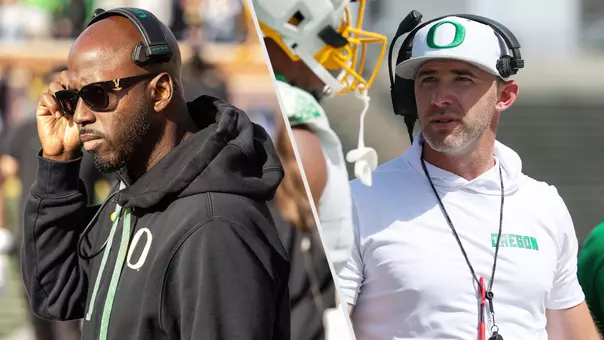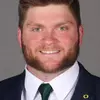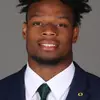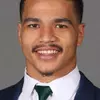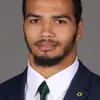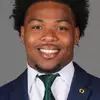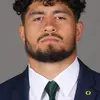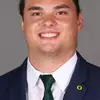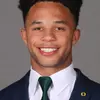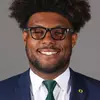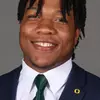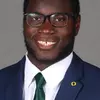
Season Wrap: Champs, Two Times Over
01/08/20 | Football, @GoDucksMoseley
The 2019 Oregon football team overcame numerous obstacles on the way to being crowned champions of the Pac-12 Conference and the Rose Bowl Game.
Standard practice these days for a football program is to "block out the noise" heading into a big game.
To ignore the narratives permeating media coverage. To disregard storylines that may be interesting to fans, but could distract players and coaches from the task at hand: winning a football game.
Oregon was having none of that in December. And the Ducks' embrace of the big picture only served to make their 28-27 Rose Bowl victory, capping a 12-2 season that included a Pac-12 Championship, that much sweeter.
The Ducks' victory on New Year's Day bookended a season that began with defeat, a narrow loss to Auburn in a neutral-site game Aug. 31. And for the team's seniors, it bookended careers that began as freshmen in 2016, when the program endured a coaching change after a four-win season.
"That's something all of us have talked about these past couple weeks," quarterback Justin Herbert said following his three-touchdown performance in the Rose Bowl, reflecting on a career that saw him take over as the Ducks' starter while just a true freshman in 2016.
"And to realize where we were and where we are now, it's been a great journey. For us to stick together through those tough times, it's just a testament to all the guys on the team and all the hard work that we've put in."
The Rose Bowl was a statement about the resiliency of seniors like Herbert, offensive guard Shane Lemieux, linebacker Troy Dye and offensive tackle Calvin Throckmorton, all four-year starters who took their lumps as freshmen, but rebuilt the program exceptionally quickly. It also validated the new direction for Oregon under head coach Mario Cristobal.
In his second year with the Ducks, Cristobal has rebranded Oregon as a physical, hard-nosed team capable of outslugging Utah in the Pac-12 title game, and Wisconsin in the Rose Bowl. Hired by athletic director Rob Mullens in December 2017, Cristobal went 21-6 in his first two full seasons at the helm, becoming one of three coaches to lead Oregon to a 12-win season and one of four to lead the Ducks to a Rose Bowl title.
With first-year defensive coordinator Andy Avalos vaulting his unit into the conversation as one of the top 10 or 15 defenses in the country, the Ducks have come a long way from the lightning-fast, run-up-the-score Oregon teams from earlier in the decade. In the interim, they had to swallow the program's darkest year in two decades, but they emerged stronger for it.
"We've been down and out," said junior safety Brady Breeze, a redshirt during the 2016 season who had a touchdown on special teams in the Rose Bowl. "We've had three head coaches in four years, three D coordinators in four years. And I wouldn't trade it for the world, because it's made us better men and better teammates."
One could make a case that Oregon navigated turnover in the program better than anyone in conference history. The Ducks became the third different Pac-12 team to have three or more Rose Bowl seasons in the same decade – USC has done it four times, and UCLA once, in the 1980s. But only Oregon was able to reach three or more Rose Bowls in the same decade under three different head coaches, a testament not only to the resiliency of the players and staff but also an administration that navigated the program through some rough waters.
The nation took notice. Close to 50 million combined viewers watched telecasts of Oregon's 14 games this season. That speaks to the team's continuing status as a national brand, to the wisdom of playing high-profile nonconference matchups such as the Auburn game, and to just one slice of the value of reaching a premier postseason destination like the Rose Bowl.
Those that tuned in for the Auburn game were getting their first chance to see a team on the rise after a nine-win 2018 season that included the Ducks' first postseason victory in four years. The offseason had been uplifting based on decisions by Herbert and Dye to stay in school as seniors, and by the addition of Avalos to the defensive staff – along with new linebackers coach Ken Wilson, who would help the Ducks recruit the top two inside linebackers in the country over the course of 2019.
The biggest question in the offseason was at receiver. Drops plagued Oregon in 2018, but the 2019 team featured graduate transfer Juwan Johnson, freshman Mycah Pittman and rejuvenated junior Johnny Johnson III. For the opener, though, Juwan Johnson and Pittman both were injured. Ranked No. 11 to start the season, Oregon led No. 14 Auburn early in the second half, 21-6, only to lose momentum late in the game and fall, 27-21.
It wouldn't be the last time the Ducks found themselves backed into a corner. After regrouping to go 2-1 in nonconference play, Oregon won three Pac-12 games in a row. Then, in rivalry games at Washington and against the program's kryptonite in recent years, Washington State, the Ducks won in back-to-back weeks on game-winning drives in the fourth quarter.
They would do the same in the Rose Bowl, showing the same resiliency against Wisconsin that was forged in the loss to Auburn, and molded during wins over the Huskies and Cougars.
"Our guys knew this was going to be a 15-round fight," Cristobal said after the Rose Bowl. "And our guys just found a way to keep swinging, get up one more time, throw one more punch. And it's a testament to what they are, what their DNA is. And I really believe these guys are just getting started."
After opening 2020 with a victory in the Rose Bowl, the future is bright for Oregon football. But the Ducks have significant questions to answer moving forward, with the need to replace Herbert, Dye and the nation's best offensive line, according to Pro Football Focus – though the return of Outland Trophy winning left tackle Penei Sewell is a nice foundation to rebuild around.
The graduating class also included some players whose careers were cruelly cut short by injury, opening week starters Jake Breeland and Gus Cumberlander. Their contributions over the last five seasons were no less significant than classmates including Bryson Young, Brady Aiello, Blake Maimone and Drayton Carlberg, who may not have been as high-profile over the years but who played huge roles in the Rose Bowl season.
Herbert's loss will be felt acutely, and not only because he was a four-year starter at quarterback. He brought to every practice and each game the passion of a hometown kid living out his dream, which the Eugene native was as starting quarterback for Oregon. In a career interrupted by a sophomore-season shoulder injury, Herbert threw for 10,541 yards – ranking 14th in Pac-12 history – and his athleticism was key to the Ducks' postseason wins over Utah and Wisconsin.
Herbert was named offensive MVP of the Rose Bowl after rushing for three touchdowns, including the game-winning score with 7:41 left in the fourth quarter.
"He can beat you in so many ways," Cristobal said. "You see the legs, you see the arm and the decision-making, but what you don't see is the leadership and the heart. And in the end that was the biggest difference, in my opinion."
Herbert was one of two native Oregonians to earn Rose Bowl MVP honors, along with Breeze, the Portland-area native who scored three touchdowns in 2019. Breeze had 11 tackles in the Rose Bowl, after also leading the Ducks in tackles against Utah. His physical presence was a perfect match for the powerful Utes and Badgers, making Breeze a Rose Bowl champion 25 years after his uncle, former UO safety Chad Cota, helped lead the Ducks to the 1995 game in Pasadena.
"It's cool to see all these people waving at us in the stands and stuff, all these fans, all these little kids, just like when I was at the game watching Ohio State play Oregon (in 2010) and Florida State play Oregon (in 2014)," Breeze said. "I was just a fan, dreaming of playing in these type of games. …
"It's just amazing, two kids from the state of Oregon just going out there having fun and playing football, and I made sure to take it all in. It's just incredible."
The Rose Bowl was the Ducks' sixth straight win in the state of California, sweet victory for the team's "CaliFlock" of contributors. That group is headlined by Dye, the first player in school history to lead the team in tackles four straight years, whose toughness in playing the second half of the season with a thumb injury embodied Oregon's resiliency. The "CaliFlock" also includes starting cornerbacks Deommodore Lenoir and Thomas Graham Jr., each of who came up with a turnover against Wisconsin, and running back CJ Verdell, whose 1,220 rushing yards in 2019 ranks 11th in UO single-season history.
The "CaliFlock" includes younger contributors too, like dynamic nickel Jevon Holland, and backup running backs Travis Dye and Cyrus Habibi-Likio, and also Pittman, who returned from injury twice during the season and played in seven games – all victories for the Ducks. And it includes defensive end Kayvon Thibodeaux, the dynamic pass rusher who molded himself into a physical force at the line of scrimmage, and more than held his own in the Rose Bowl with Wisconsin's vaunted interior line.
"I'm incredibly proud of this football team," Cristobal said. "Not only the seniors, but the entire team, and the way they've been resilient, and continued to press on and moved forward.
"And ended up not only Pac-12 champions, but also Rose Bowl champions."










